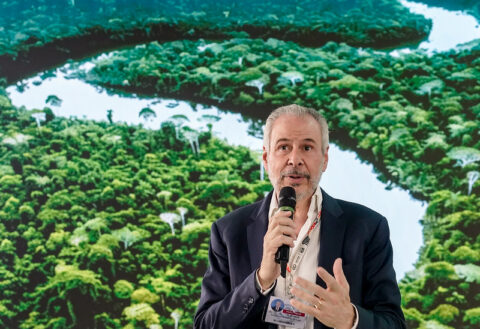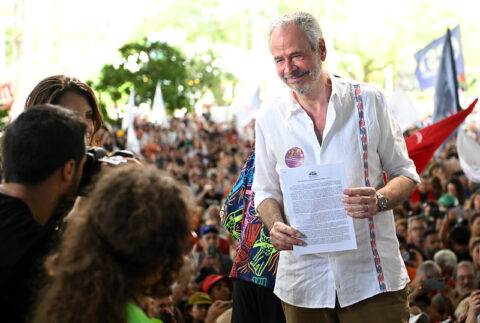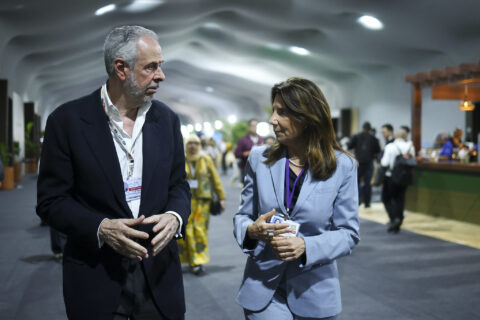Following a dramatic fire and evacuation yesterday afternoon, negotiations restarted and continued into the night, with the COP30 presidency putting out a series of draft texts, including the main “Mutirão” cover decision at 3am local time. What’s most contentious is what’s not in them.
There are no roadmaps for transitioning away from fossil fuels or for halting deforestation, as called for by Brazil’s president and around half of countries.
Because of these omissions and concerns on finance, a group of 29 countries – from Europe, Latin America and small islands – wrote a joint letter to the Brazilian COP presidency expressing their “deep concern” over what they call “a take it or leave it” proposal.
“The legacy of the Presidency in making COP30 a milestone moment will depend on the quality – rather than the speed – of the outcome,” they wrote, adding “a weak text would be remembered as a missed and regrettable opportunity and would undermine the credibility of the process, of the Presidency and of the [climate] regime itself”.
They added that they are “concerned by emerging narratives suggesting that ambitious countries are slowing progress” and “the challenge arises when a package that omits essential elements is presented with the expectation of unconditional acceptance, reflecting only what is acceptable to a limited few”.
They call for the Presidency to submit a revised proposal and not ask them to “accept only what the least ambitious are willing to allow”. EU Climate Commissioner Wopke Hoekstra said the text was “no way close to the ambition we need on mitigation” and “we are disappointed with the text currently on the table”.
All governments are scheduled to gather for a plenary meeting around 10 or 11am, where fireworks are likely.
Vague goal to triple adaptation finance included
The draft text does include a “call for efforts” for developed countries to triple adaptation finance compared to 2025 levels by 2030 and “urges” developed countries to “increase the trajectory” of their adaptation finance.
But it has no numbers attached to it and the EU’s climate commissioner Wopke Hoekstra said that that the EU is “willing to be ambitious on adaptation, but we would like to make clear that any language on finance should squarely be within the commitment reached last year on the [New Collective Quantified Goal on finance agreed at COP29]”.
The tripling idea emanated from the Least Developed Countries in Bonn in June and was later picked up by other developing countries. With indicators for the Global Goal on Adaptation being negotiated in a separate room, developing countries have argued that deciding on metrics to measure adaptation has little point if developed countries are not going to properly fund it.
“Calls” is the same verb used in the COP26 pledge – which is off track – for developed countries to double adaptation finance by 2025. “Calls” is one of the softer verbs used in climate talks, weaker than “instructs”, “urges”, “invites” or “encourages”.
And the baseline – and lack of a quantitative target – will likely raise concerns. Developing countries want a tripling from the amount of adaptation finance developed countries should be providing in 2025, which would be an increase from at least $40bn to $120bn a year.
If calculated from actual 2025 adaptation finance levels, analysis by CARE and Oxfam suggests that is likely to be around $25 billion, though exact figures will not be available until 2027. Using that baseline rather than the 2025 goal could shave about $50 billion a year off what developing countries can expect in 2030, which will not meet rapidly rising needs amid worsening droughts, floods, storms and heatwaves.
Tricky issues of trade, finance and emissions cuts covered
The ‘Mutirao’ text covers the contentious issues which competing negotiating blocks tried, and failed, to get on the COP agenda. It proposes outcomes including new initiatives, talks and calls – but nothing concrete and significant.
On emissions-cutting ambition – a small island and EU priority – the text proposes the creation of a “Global Implementation Accelerator” and a “Belem Mission to 1.5” – both aimed at helping countries improve their climate action. Governments are also “encourage[d]” to strengthen their existing NDC climate plans “at any time with a view to
enhancing its level of ambition”.
On finance – a developing country priority – the text “decides” to scale up finance for developing countries and “calls for enhanced efforts” to meet the COP29 promise to triple annual outflows of funds like the Green Climate Fund. And it promises a “roundtable” of senior ministers on how they’re meeting the finance goal decided at COP29.
On the nexus between trade and climate – an emerging economy priority to discuss – it requests three annual dialogues at the June Bonn sessions. An African trade negotiator told Climate Home News it was “a start” but disappointing that there is not a “full COP item on it”. “It’s like they want to kill it but in a polite way,” the negotiator said.
The post COP30 Bulletin Day 11: Countries revolt as new text leaves out fossil fuel roadmap appeared first on Climate Home News.
COP30 Bulletin Day 11: Countries revolt as new text leaves out fossil fuel transition roadmap
Climate Change
DeBriefed 21 November 2025: [COP30 DeBriefed] ‘Mutirão’ text latest; ‘Roadmaps’ explained; COP finish times plotted
Welcome to Carbon Brief’s DeBriefed.
An essential guide to the week’s key developments relating to climate change.
This week
Key ‘mutirão’ text emerges
‘MUTIRÃO’ 2.0: After many late nights, but little progress – and a dramatic fire at the COP30 venue – the much-awaited second draft of the summit’s key agreement, called the “mutirão” text, finally dropped this morning. The new mutirão text “calls for efforts to triple adaptation finance” by 2030 and would launch a presidency-led “Belém mission to 1.5C” alongside a voluntary “implementation accelerator”, as well as a series of “dialogues” on trade. It “decides to establish” a two-year work programme on climate finance, including on a key section of the Paris Agreement called Article 9.1, but has a footnote saying this will not “prejudge” how the climate finance goal agreed last year is met.
ROADMAPS TO NOWHERE: The latest draft does not refer to the idea of a “fossil-fuel roadmap”, which is not on the COP30 agenda, but has been pushed by Brazil’s president Luiz Inácio Lula da Silva and a group of parties (see below). A letter to the presidency, seen by Carbon Brief and reportedly backed by at least 29 countries, including Colombia, Germany, Palau, Mexico and the UK, says: “We cannot support an outcome that does not include a roadmap [on fossil fuels].” It also flags the lack of a roadmap on deforestation. The letter asks for a revised text.
PLENARY WHEN: The latest draft of the mutirão text is unlikely to be the last. There is also a set of draft decisions that have not been fully resolved. For instance, this morning, the Brazilian COP presidency floated a draft decision on what it is calling the “Belém gender action plan”, with three brackets versus the 496 brackets in the previous version. At a short, informal stocktaking plenary, COP30 president André Corrêa do Lago invited countries to react to the drafts in a “mutirão” meeting, namely, in the “spirit of cooperation”. But expect all timings to be flexible, as they work to iron out differences in closed-door meetings.
Adaptation COP
TRIPLING TARGET: A new text for the global goal on adaptation dropped alongside the mutirão text this morning, after days of tense negotiations. Crucially, it includes the adoption of some of the indicators, which will be used to track countries’ progress on adaptation. Last week, the African Group and others called for the indicators not to be adopted at COP30 – one of the key expectations ahead of the summit – and, instead, a two-year work programme to further refine them due to concerns around adaptation finance.
INDICATORS: The latest text adopts an annex of 59 of the potential 100 indicators, emphasises that they “do not create new financial obligations or commitments” and decides to establish a two-year “Belém-Addis vision” on adaptation to further refine the indicators. The only remaining bracket within the text is to allow for the addition of the final adaptation finance target from the mutirão – which, currently, “calls for efforts to triple adaptation finance compared to 2025 levels by 2030”.
WHAM BAM: The latest text for another key negotiating stream on the “just transition work programme” (JTWP) “decides to develop a just transition mechanism”. This has been a point of particular contention within negotiations. Civil society developed the concept of the Belém Action Mechanism (BAM) over the past year and the G77 and China, a large group of global-south nations, tabled it within the JTWP in the first week. However, there was pushback from the EU, UK and others, with the former instead proposing an “action plan” as an alternative.
CRITICAL MINERALS: While landing on the inclusion of a mechanism is being welcomed by civil society and others, the latest text removes the reference to critical minerals included in its predecessor. If included, it would be the first time a reference to “critical minerals” is adopted in the JTWP.
Around the COP
- Turkey will host COP31, while Australia will take on the presidency and lead the negotiations, under a compromise deal reached between the two nations on Thursday, Reuters reported.
- Brazil set out a plan before COP30 to reform the “action agenda” – which includes 117 “plans to accelerate solutions” outside of the negotiations, covering everything from fossil-fuel phaseout to “sustainable diets for all”. On Wednesday, the presidency rounded off a series of events that have been used to promote this vision.
- China called for the creation of a “practical roadmap” for delivering climate finance by developed countries, which delegation head Li Gao said would help “prevent further erosion of trust between developed and developing countries”.
- An estimated 70,000 people marched in 32C heat in Belém on Saturday, marking the largest COP protest since COP26 in Glasgow.
52
The number of COP30 agenda items that had been agreed by the time DeBriefed was sent to readers.
51
The number of COP30 agenda items not yet agreed.
Latest climate research
- A five-year drought in Iran and around the Euphrates and Tigris basins “would have been very rare” without human-caused climate change | World Weather Attribution
- Integrating nature-based solutions into urban planning could reduce daytime temperatures by 2C during hot periods | Nature Cities
- Warming of the “deep Greenland basin” has exerted “obvious impacts” on the deep waters of the Arctic Ocean | Science Advances
(For more, see Carbon Brief’s in-depth daily summaries of the top climate news stories on Monday, Tuesday, Wednesday, Thursday and Friday.)
Captured
This week saw the Brazilian presidency pledge to conclude some of the most controversial issues at COP30 a whole two days early. In the end, no early deal materialised. As the event approaches its official end time later today, with none of the major negotiations finished, this chart serves to remind that COPs have not finished on time for more than two decades.
Spotlight
‘Roadmaps’ explained
This week, Carbon Brief explains the push for new “roadmaps” away from fossil fuels and deforestation at COP30.
Speaking during the world leaders summit in Belém ahead of COP30, Brazilian president Luiz Inácio Lula da Silva said that the world “need[s] roadmaps to justly and strategically reverse deforestation [and] overcome dependence on fossil fuels”.
His words appeared to spark a movement of countries to call for new roadmaps away from fossil fuels and deforestation to feature as key outcomes of this COP – despite not being on the official agenda for the negotiations.
While momentum for each roadmap has grown, they were referenced only as an option in the first version of COP30’s key text, called the “global mutirão” – and in the second version the reference to roadmaps has disappeared entirely.
Below, Carbon Brief explains the origins of each roadmap, how support for them has grown and how they might feature in COP’s final outcome.
Fossil-fuel roadmap
Most people cite Lula’s pre-COP speech as the start of the movement for a fossil-fuel roadmap.
However, an observer close to the process told Carbon Brief that the COP30 presidency had, in fact, been consulting on the possibility of a roadmap months earlier – drawing help from the Beyond Oil and Gas Alliance, a small group of nations who have pledged to phase out all fossil fuels.
While Brazil was the first country to support the fossil-fuel roadmap, it was joined in the first few days of COP by eight Latin American countries that form the Alliance of Latin America and the Caribbean (AILAC) and by the Environmental Integrity Group (EIG), which includes Mexico, Liechtenstein, Monaco, South Korea, Switzerland and Georgia.
The call for a roadmap was also backed by the Alliance of Small Island States (AOSIS), a group of 39 small low-lying island nations.
As momentum grew, the first global mutirão text appeared on Wednesday 19 November. Paragraph 35 of the text listed three options for where a reference to a fossil-fuel roadmap map might be incorporated, including one option for “no text”.
Later that day, ministers and climate envoys from more than 20 countries united for a packed-out press conference, where they called the current reference to the fossil-fuel roadmap “weak”, adding that it must be “strengthened and adopted”.
At the sidelines of the conference, UK climate envoy Rachel Kyte told journalists that around 80 countries now backed the call for a roadmap. (Carbon Brief obtained the list of 82 countries that have expressed their support.)
However, COP30 CEO Ana Toni told a press conference later that day that a “great majority” of country groups they had consulted saw a fossil-fuel roadmap as a “red line”.
In an interview with Carbon Brief, Dr Osama Faqeeha, deputy environment minister for Saudi Arabia, refused to be drawn on whether a fossil-fuel roadmap was a red line, but said:
“I think the issue is the emissions, it’s not the fuel. And our position is that we have to cut emissions regardless.”
The next day, the EU officially threw its weight behind the call for a fossil-fuel roadmap, after initial delay caused by hesitation to join the movement from Italy and Poland, Climate Home News reported.
The EU circulated its own proposal for how a fossil-fuel roadmap could be referenced in the global mutirão text, the publication added.
However, the latest version of the global mutirão text, released today, does not reference a roadmap at all. It has already sparked condemnation from a range of countries and observers.
It is expected that at least one more iteration of the text will emerge before the COP30 presidency attempts to find agreement, which could see a reference to the roadmap reappear.
Deforestation roadmap
While Lula called for roadmaps away from both fossil fuels and deforestation, the latter has received less attention, with one observer joking to Carbon Brief it had become the “sad forgotten cousin”.
A roadmap away from deforestation was originally only backed by Brazil, the EIG and AILAC.
However, the EU became a relatively early backer – announcing its support for a deforestation roadmap before a fossil-fuel roadmap.
The Democratic Republic of the Congo – one of the world’s “megadiverse” nations and one of the countries responsible for the Congo rainforest – has also announced its support. (See Carbon Brief’s list of supporters.)
As with the fossil-fuel roadmap, a reference to a deforestation roadmap appeared in the first iteration of the mutirão text, but has disappeared from the second. It may – or may not – appear in another version of the text before COP30’s finale.
Watch, read, listen
FOREST TALES: In a new video series from Earthday.org and the Pulitzer Centre, three investigative journalists discussed their reporting on deforestation in Brazil and the Democratic Republic of the Congo.
AI IMPACTS: Google CEO, Sundar Pichai, spoke to BBC News about the climate impacts of AI, among other topics.
MISSING DATA: Columnist George Monbiot wrote in the Guardian about the “vast black hole” of climate data in some parts of the world – which he says is a “gift” to climate deniers.
Coming up
- 22-23 November: G20 summit, Johannesburg, South Africa
- 24 November-5 December: 20th meeting of the Conference of the Parties to the Convention on International Trade in Endangered Species (CITES), Samarkand, Uzbekistan
- 24-29 November: 11th session of the governing body of the International Treaty on Plant Genetic Resources for Food and Agriculture, Lima, Peru
Pick of the jobs
- Department for Energy Security and Net Zero, chief press officer | Salary: £60,620-£67,565. Location: London
- World Bank Group, climate change specialist | Salary: Unknown. Location: New Delhi, India
- University of Buffalo, Center for Climate Change and Health Equity, postdoctoral associate | Salary: $50,000-$55,000. Location: Buffalo, New York
- University of Oxford, Queens College, junior fellow in climate change research | Salary: £37,694. Location: Oxford, UK
DeBriefed is edited by Daisy Dunne. Please send any tips or feedback to debriefed@carbonbrief.org.
This is an online version of Carbon Brief’s weekly DeBriefed email newsletter. Subscribe for free here.
The post DeBriefed 21 November 2025: [COP30 DeBriefed] ‘Mutirão’ text latest; ‘Roadmaps’ explained; COP finish times plotted appeared first on Carbon Brief.
Climate Change
Rich nations push back on calls for new just transition mechanism
Developed nations including the UK, Norway, Canada, Australia and the EU are pushing back on a proposal at COP30 to create a just transition mechanism to bolster and unify efforts to help workers and communities adversely affected by the shift away from fossil fuels, the plan’s backers say.
Championed by civil society activists who have dubbed it the “Belém Action Mechanism” (BAM), the proposal to establish a dedicated global facility won backing at the climate talks from the largest group of developing nations, the G77+China. Under the proposal, developing countries would receive financial and technical assistance aimed at ensuring a fair transition to clean energy.
A global green shift is expected to change the nature of employment in sectors such as coal mines, oil refineries, construction and car factories. Jobs will be lost in high-carbon industries and new ones created in clean technology supply chains, bringing both threats and opportunities for the affected workers and their families and communities.
Activists say establishing an institutional framework is vital to making sure global climate action to cut emissions does not end up leaving anyone behind.
But a significant number of developed countries are “generally not being positive about the mechanism”, said Anabella Rosemberg, senior advisor on just transition at Climate Action Network International, adding that they did not see the need for a coordination unit on just transition policies.
“Basically these countries do not want any new or innovative way of bringing the just transition community together,” Rosemberg said, referring to the proposals for the mechanism aimed at facilitating global dialogue, sharing best practice and informing new policy around the world.
The draft text on the UN’s Just Transition Work Programme released on Tuesday included several alternatives to the mechanism, including an action plan and a policy toolbox to help countries advance their just transition plans and turn principles into concrete national strategies.
UN Secretary-General António Guterres welcomed the calls for the mechanism, as well as the “growing coalition asking for clarity on the transition away from fossil fuels”.
“Governments must support workers and communities still relying on coal, oil and gas with training, protection and new opportunities to go on with their lives in a positive way,” he said at COP30 on Thursday.
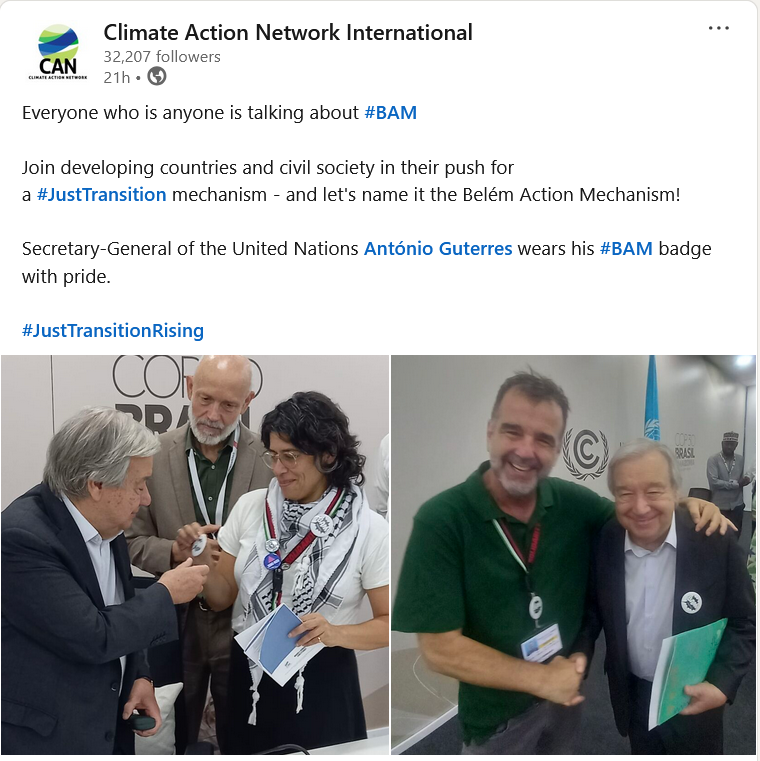

Sharing know-how, and financing
Supporters of the BAM proposal say just transition efforts are currently fragmented and would benefit from having an institutional mechanism to pull together funding and policymaking experiences, as well as fostering cooperation between different agencies and financial institutions working to support just transition.
“What we are trying to do with the mechanism is to really help the countries that want to put [just transition] strategies in place access much faster the capacity and the financing that is out there,” Rosemberg said.
Bert De Wel, global climate policy coordinator at the International Trade Union Confederation (ITUC), said a mechanism could help countries introduce just transition policies “with a strong focus on labour rights, trade union participation and social dialogue”.
Integrate just transition instead, says Norway
Some opponents of creating a new mechanism say just transition efforts would be better advanced by strengthening existing institutions rather than building a new one.
“This is most efficient because then the committees can start working without delay,” a spokesperson from the Norwegian Ministry for Climate and Environment told Climate Home News, adding that existing bodies under the Paris Agreement already cover most of the topics in the just transition draft decision, including finance, technology development and transfer, and capacity building
“It takes many years to develop a new mechanism,” the spokesperson said, even if countries can overcome their current differences over its potential scope and mandate. In the meantime, Norway supports developing guidance for existing bodies to better integrate just transition into their work.

“Not a fund”
The fear that a BAM could become another source of financial demands is one of the biggest concerns for the EU and developed countries, De Wel said. But while public finance is needed to roll out a just transition, he said “this doesn’t mean that these issues need to be sourced in the just transition mechanism”.
A just transition for renewables: Why COP30 must put people before power
He said the mechanism would seek to get multilateral development banks and other funders on board to make sure that money is being spent in a way that “respects labour criteria” and does not stop the Global South accessing resources that are already available.
Rosemberg said there have been questions around whether the mechanism would be a new fund but the civil society and G77 proposals clarify that the two things are not the same. “This is much more a facility for accelerating delivery of finance that already exists than a new fund,” she said.
Rosemberg said, however, that what would need to be funded is the operation of the BAM, which would cost about $10 million per year. This money would support research and the setting up of a secretariat, Kuda Manjojo of Power Shift Africa told Climate Home.
The post Rich nations push back on calls for new just transition mechanism appeared first on Climate Home News.
Rich nations push back on calls for new just transition mechanism
Climate Change
COP30 Bulletin Day 10: UN chief backs call to triple adaptation finance
As negotiations on a Belém “Mutirão” decision dragged on beyond the Wednesday deadline the COP30 presidency had targeted, UN chief António Guterres called on governments to agree a balanced political package that would require compromise and courage.
Such a package should be “concrete on funding adaptation, credible on emissions cuts, bankable on finance”, he told journalists on Thursday morning.
He rallied behind a demand from the world’s poorest countries to triple finance to help them adapt to more extreme weather and rising seas to $120 billion by 2030.
He noted that communities on the frontlines are watching the UN summit – “counting flooded homes, failed harvests, lost livelihoods and asking ‘how much more must we suffer?’” “They have heard enough excuses, they demand results,” he added.
COP30 Bulletin Day 9: Belém package elusive as Lula steals the show
He warned that an “inevitable” temporary overshoot of the 1.5C warming limit in the Paris Agreement means “more heat and hunger, more disasters and displacements”.
“For millions, adaptation is not an abstract goal,” the Portuguese official insisted. “It is the difference between rebuilding and being swept away, between replanting and starving, between staying on ancestral lands or losing it forever.”
Adaptation needs are “skyrocketing and the overshoot will push them even higher”, he added. Despite this, developed countries’ commitment to double adaptation finance to at least $40 billion by this year “is slipping away”, he warned.
Poorest countries appeal for more adaptation finance at COP30
The latest estimate of developing countries’ annual climate adaptation needs for 2035 outstrips current funding by at least 12 times, with rich nations providing just $26 billion in 2023, according to the annual UN Adaptation Gap Report.
If current trends continue, developed countries are set to miss the 2025 target that they committed to at COP26 four years ago, UNEP’s report said.
“So tripling adaptation finance by 2030 is essential,” Guterres said, adding that it is also “possible and desirable” and he hoped developed countries would “accept to engage in this objective” at COP30 if their concerns on emissions reductions are addressed.
He noted that a new fund to help countries recover from loss and damage is practically empty and called for it to be capitalised. During COP30, the fund has received tiny pledges totalling less than $16 million from Iceland, Japan and Luxembourg. It has now secured combined promises of nearly $800 million but only around half of that is in the bank.
Guterres urged funders, including wealthy governments, climate funds and development banks “to step up and prevent further tragedies”. “It’s about survival, it’s about justice – and for Indigenous peoples, it is also about protecting cultures and homelands that sustain our planet’s vital ecosystems,” he added.
To ramp up emissions-cutting efforts and bring warming back down to 1.5C, he said countries’ national climate plans (NDCs) should be the “floor not the ceiling”, with the responsibility on big emitters to do more.
He did not explicitly back a roadmap to transition away from fossil fuels, as more than 80 countries are pushing for at the talks, but said governments should implement the energy shift they signed up to at COP28 and ensure it is done in a fair way.
Asked if he wanted the US to return to the UN climate process, which climate-change denier President Donald Trump has abandoned, Guterres said “we are waiting for you”, quipping “hope is the last thing that dies”.
Germany pledges €1 billion to TFFF forest fund
Germany has joined a handful of countries pledging money to the Tropical Forest Forever Facility (TFFF), but the conservation mechanism launched by Brazilian President Luiz Inácio Lula da Silva ahead of COP30 is still far short of the $25 billion in public funds it aims to secure.
Following talks between government ministers and Lula yesterday, Germany said it would contribute one billion euros ($1.1 billion) over the next 10 years, praising the “innovative approach” of the investment-driven multilateral fund proposed by Brazil.
The TFFF is a blended finance instrument that will invest in financial markets and pay a share of any returns to tropical countries that are protecting their rainforests. At least 20% of all payments must be allocated to Indigenous people and local communities. Read this Climate Home News explainer for more details of how the fund works.


“It’s about protecting the tropical rainforests, the lungs of our planet,” a statement by Germany’s development and environment ministers said after Wednesday’s meeting.
At a press conference this Thursday, German environment minister said the country will disburse $100 million every year over a decade in the form of a grant, which experts said could allow for larger payouts to forest countries since the fund wouldn’t have to pay interest. The money would come from the country’s foreign aid budget.
Germany’s promise of support follows a Norwegian pledge of 3 billion euros over the coming decade – which are conditional to other donors also contributing money to the fund, while Brazil and Indonesia have pledged $1 billion each, with Colombia offering $250 million. France has also said it will consider contributing 500 million euros over the next five years.
But campaigners were critical of the German contribution, as the world’s third-largest economy has pledged about the same amount as Brazil and Indonesia. A group of German NGOs sent a letter to government officials requesting the country to pledge at least $2.5 billion for the TFFF.
“That the German government is investing in the TFFF is important and the right thing to do. Nevertheless, the investment amount of one billion euros is a disappointment,” said Felix Finkbeiner, founder of Germany-based conservation NGO Plant-for-the-Planet.
Florian Titze, WWF-Germany Head of International Policy, also said the sum was “disappointing”, given that Chancellor Frierich Merz told world leaders at COP30 that the country would pledge a “considerable” amount. “The federal government should now successively increase the German amount and distribute it over the next few years.”
The total pledged so far to the TFFF amounts to roughly $7 billion. However, experts noted that, because Norway’s pledge is conditional and doesn’t count toward the $10bn target set by the Brazilians at COP30, the fund has been left with about a $6bn shortfall.
British climate minister Ed Miliband said on Monday the UK government was keeping “the option of an investment under review”.
Talks have also been held with China, the United Arab Emirates, Australia, Japan and Canada, Brazilian TFFF official João Paulo de Resende told Climate Home News last month. None of those countries have so far announced pledges
De Resende said securing political support was more important at this stage than funding promises, which can come later.
Roman ruins and lots of hotels – Türkiye’s pitch to host COP31
Outlining their ultimately successful bid to host COP31, Turkish officials pitched the country as a lower-emissions choice due to its location at the crossroads of Europe and Asia, and played up the rich cultural heritage and top-level tourist facilities of the resort city of Antalya.
Australian Minister for Climate Change and Energy Chris Bowen announced last night that his country was ceding the summit’s hosting rights to Türkiye, though Australia – which had greater support for its candidacy – will lead the negotiations.
Türkiye’s pitch for the talks to be held in Antalya, made in a presentation to delegates at the Bonn climate talks in June, promised to deliver a “zero-waste COP”, with a strong focus on heritage sites such as nearby Roman ruins and a shrine to Saint Nicholas of Myra, the inspiration for Santa Claus. The presentation’s slides also praised the Mediterranean city’s food and golf courses.
Turkish officials argued that a COP held in Antalya would have a smaller carbon footprint than Australia’s proposal of Adelaide due to its central geographical location, and also sought to emphasise the city’s urban transport network as well as its strong local logistics and supply chain.

Antalya, which is a similar size to Belém, with a population of roughly 1.5 million people, is popular with European and Russian sun-seekers in summer. By November, when the COP will be held, temperatures will have dropped to highs of about 21C (70F). That means COP delegates won’t have to compete with as many tourists for the 628,000 beds that the Turkish government says the city has to offer – far more than Belém.
But at a time of worries about democratic backsliding in Türkiye, hosting COP31 in Antalya may draw concerns.
Mahir Ilgaz, a Turkish regional programme director at Oil Change International, voiced concern about the decision, noting in a social media post that elected mayors – including Antalya’s – have been replaced by government-appointed trustees.
“Colleagues working on local engagement are already wondering how to operate safely and meaningfully in that context”, he wrote on LinkedIn.
Meanwhile, a former Turkish climate diplomat told Climate Home News that they were disappointed Turkiye would not hold the presidency.
“We bear the burden, but they hold the power. We have the drum but they hold the drumstick. We do the work but they make the decisions,” the official said.
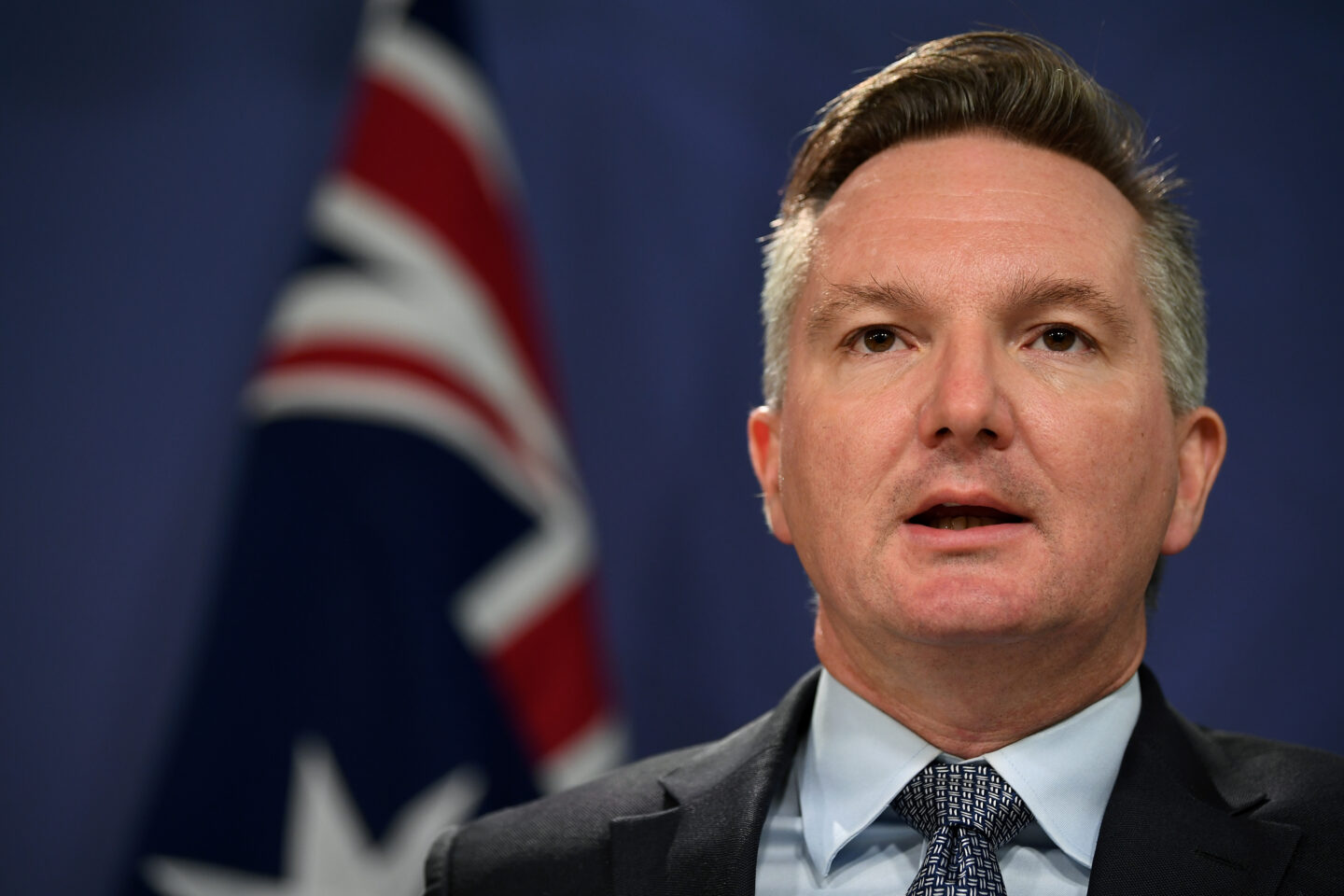
The post COP30 Bulletin Day 10: UN chief backs call to triple adaptation finance appeared first on Climate Home News.
COP30 Bulletin Day 10: Talks disrupted as fire causes evacuation
-
Climate Change3 months ago
Guest post: Why China is still building new coal – and when it might stop
-
Greenhouse Gases3 months ago
Guest post: Why China is still building new coal – and when it might stop
-
Climate Change2 years ago
Spanish-language misinformation on renewable energy spreads online, report shows
-

 Greenhouse Gases1 year ago
Greenhouse Gases1 year ago嘉宾来稿:满足中国增长的用电需求 光伏加储能“比新建煤电更实惠”
-
Climate Change Videos2 years ago
The toxic gas flares fuelling Nigeria’s climate change – BBC News
-

 Climate Change1 year ago
Climate Change1 year ago嘉宾来稿:满足中国增长的用电需求 光伏加储能“比新建煤电更实惠”
-

 Carbon Footprint2 years ago
Carbon Footprint2 years agoUS SEC’s Climate Disclosure Rules Spur Renewed Interest in Carbon Credits
-
Renewable Energy4 months ago
US Grid Strain, Possible Allete Sale



